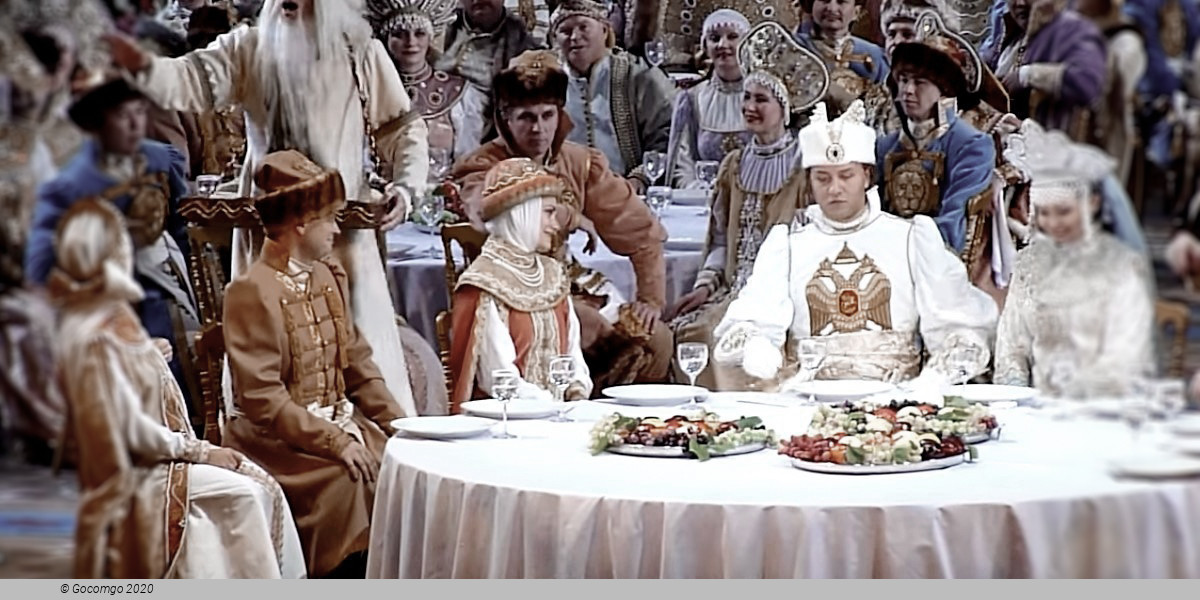Time: The time of Kievan Rus' (9th to 13th centuries)
Place: Kiev; various imaginary and fantastic locations
Act 1
In Svetozar's banquet hall, the wedding feast for Ruslan and Lyudmila is taking place. The guests listen to Bayan sing a song foretelling misfortune for the bride and groom, followed by happiness from true love. Lyudmila, saddened by the prospect of leaving her father, offers words of comfort to her unsuccessful suitors, Farlaf and Ratmir, and then pledges herself to Ruslan. Svetozar blesses the couple. All of a sudden everything goes dark and there is a crash of thunder. The people are paralysed by a spell while two monsters carry Lyudmila away. When light returns and everyone recovers, they panic over Lyudmila's disappearance. Svetozar promises half his kingdom and Lyudmila's hand to the man who brings her back. The three suitors ready themselves for the journey to find Lyudmila.
Act 2
Tableau 1
Ruslan comes upon the cave of the kindly wizard Finn, who tells him that the evil sorcerer Chernomor has absconded with Lyudmila and that Ruslan is the man who will destroy him. Ruslan asks Finn why he lives in this deserted place, and Finn relates the story of many years ago, when he was a shepherd in his distant homeland (he says he is "a Finn") and fell in love with a beautiful girl named Naina. When she rejected his declaration of love, he went off to do battle with enemies for booty. Returning with this booty, he presented it to Naina, but she yet again spurned him. Then he resolved to study magic to win her; many years went by, and through sorcery he finally summoned an old, grey-haired, humpbacked woman – it was Naina, who now was mad with passion for him. He ran away from her and has been hiding from her ever since. For abandoning her, Naina is consumed by vengeful hatred, which will likewise fall upon Ruslan. Assuring him that Lyudmila will not be harmed, Finn instructs Ruslan to head north, and the two of them exit in opposite directions.
Tableau 2
In a deserted place, the cowardly Farlaf wonders whether he should continue searching for Lyudmila, when the decrepit Naina approaches him. She promises to get Lyudmila for him and send Ruslan far away. She disappears, and Farlaf rejoices in his triumph.
Tableau 3
Ruslan, having come upon a foggy desert strewn with weapons and bones from a past battle, wonders at the cause of this scene and whether he, too, may end up the same way. He chooses a new shield and spear from the ground to replace his broken weaponry, but cannot find a sword heavy enough to complete his new set of armor. When the fog lifts, a giant Head is revealed and blows through its lips to bring up a storm so as to drive Ruslan away. When Ruslan strikes the head with his spear, the Head falls back and reveals a sword underneath. He takes it and asks the Head whence it came. As it is dying, the Head explains that it once was a giant, and his dwarf brother is the evil sorcerer Chernomor. The sword was destined to kill both of them; so, in order to forestall fate, Chernomor tricked the giant, beheaded him, and flew his live head away to the distant desert to keep the sword protected underneath it. With the sword now in Ruslan's hands, the Head calls for vengeance on Chernomor.
Act 3
Young maidens are luring passing travelers to enter Naina's magical castle. Gorislava appears, looking for Ratmir, who had taken her captive and then abandoned her. After she goes away for a moment, Ratmir himself comes on the scene and falls under the spell of the maidens, who seduce him with dance. The final guest attracted to the castle is Ruslan, who finds himself forgetting Lyudmila upon seeing Gorislava. Suddenly Finn appears; and, after pronouncing a happy fate for Ratmir with Gorislava, and for Ruslan with Lyudmila, the castle turns into a forest as they resolve to rescue Lyudmila.
Act 4
Within Chernomor's magical gardens, Lyudmila longs for Ruslan and resists the influence of the enchanted surroundings. Chernomor with his retinue arrives; dances are performed. A trumpet call signals a challenge from Ruslan. Chernomor puts Lyudmila under a sleeping spell and goes off to fight Ruslan, who shortly comes on the scene triumphantly wearing Chernomor's beard around his helmet. Although he is disheartened by Lyudmila's condition, Ruslan, along with Ratmir and Gorislava, resolve to return to Kiev with Lyudmila to seek the aid of the magicians there. Chernomor's former slaves freely come along.
Act 5
Tableau 1
In a moonlit valley, Ruslan, Ratmir, and Gorislava, with Lyudmila, have camped for the night. Ratmir, who is standing guard, worries about Ruslan, and then expresses his happiness at his reunion with Gorislava. Suddenly the slaves report that Lyudmila once again has been abducted and that Ruslan has left in search of her. Finn appears, gives a magic ring to Ratmir that will awaken Lyudmila when she is brought back to Kiev.
Tableau 2
Lyudmila lies asleep in Svetozar's banquet hall. It turns out that Farlaf, with Naina's assistance, kidnapped Lyudmila and brought her to Kiev so as to appear to have been her rescuer. However, he cannot waken her. Horses approach, and Ruslan, Ratmir, and Gorislava arrive. Ruslan brings the magic ring to Lyudmila, and she awakens. As the tableau opens onto a view of Kiev, the people rejoice in their gods, their motherland, and the young couple.



 Teatralnaya Square 1
Teatralnaya Square 1